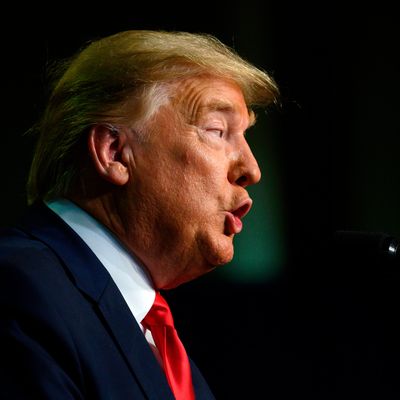
Since taking office, the Trump administration has slashed taxes by hundreds of billions of dollars, while increasing the Defense Department’s annual budget by $130 billion (a sum more than large enough to cover the costs of tuition-free public college and paid family leave). All together, the policies implemented during Donald Trump’s tenure are poised to push the federal deficit past $1 trillion this year.
That last bit isn’t necessarily concerning. Many mainstream economists consider our nation’s existing debt load more than sustainable. From a progressive perspective, the problem with Trump’s deficit spending isn’t its scale but its content.
From a self-styled fiscal conservative’s point of view, however, that $1 trillion figure is a real eyesore. And for at least some of the self-professed conservatives who work in the Trump White House, it is a source of psychological discomfort bordering on guilt.
Or at least, that’s my best guess as to why the Trump administration has, (1) spent the past several weeks refusing to endorse new spending on coronavirus preparation, despite the pleas of lawmakers in both parties for action, and (2) is still holding up funding for the imminent public health crisis by insisting on offsetting a small fraction of the emergency appropriation with a $37 million cut to home heating aid for the poor.
As the Washington Post reports:
House Democrats tell us they are outraged by one aspect of the White House response in particular: The White House appears to have informed Democrats that they want to fund the emergency response in part by taking money from a program that funds low-income home heating assistance.
A document that the Trump administration sent to Congress, which we have seen, indicates that the administration is transferring $37 million to emergency funding for the coronavirus response from the Low Income Home Energy Assistance Program, or LIHEAP, which funds heating for poor families.
Democrats see this as provoking budgetary bickering and unnecessary political friction at a time when a clean emergency appropriation could easily avoid both.
Low-income Americans in frigid regions of the country aren’t the only victims of the administration’s arbitrary penny-pinching. The White House is also calling for $535 million cut to funding for Ebola virus treatment and containment — despite the fact that the Republic of Congo is still battling an Ebola epidemic. The administration’s insistence on financing the fight against one epidemic disease with cuts to funding for the containment of a different epidemic disease — so as to avoid increasing the federal budget by .01 percent — is emblematic of this White House’s goldfish-esque lack of foresight: Since taking office, President Trump has tried to slash national health spending by $15 billion; cut the disease-fighting budgets of DHS, NSC, HHS, and CDC; allowed the ranks of the U.S. Public Health Service Commissioned Corps to steadily erode (after trying and failing to shrink its budget by 40 percent); eliminated the federal government’s $30 million Complex Crises Fund; and shut down the National Security Council’s entire global health security unit.
There is no rational explanation for the administration’s current position. The coronavirus represents a massive political liability for Trump, not least because of how indefensible his previous bouts of penny-pinching on public health now appear. There is no mass constituency for prioritizing opposition to infinitesimal increases in the national debt over pandemic prevention. In fact, many congressional Republicans were alarmed by the austerity of Trump’s proposal. As Politico reports:
Administration officials sought to swat away concerns their emergency request for $2.5 billion to address the outbreak was inadequate, even as some Republicans joined Democrats in criticizing the amount — and slamming a lack of transparency around efforts to contain the disease on U.S. soil.
… The Republican chairman of the Senate Appropriations Committee at Azar’s hearing accused the administration of making a “low ball” request.
“It could be an existential threat to a lot of people in this country,” warned Sen. Richard Shelby (R-Ala.). “So money should not be an object. We should try to contain and eradicate this as much as we can, both in the U.S. and helping our friends all over the world.”
On Wednesday, Senate Majority Leader Chuck Schumer unveiled an $8.5 billion emergency funding proposal, composed entirely of new spending. The Democrats’ counteroffer is not merely superior on the merits, but also a sound election-year messaging device: If the coronavirus creates major disruptions to American life, the Democratic Party will be able to say it demanded more ambitious preparations than the Republican president would allow; if the epidemic somehow peters out, no voters are going to reward Trump for holding the line against a $7 billion increase to the $1 trillion deficit.
Thus, the most plausible explanation for the White House’s stance is the neurosis of budget director Mick Mulvaney and his ideological kin. In the House, Mulvaney was that rare breed of a “small-government” crusader whose zeal for slashing spending didn’t spare the Pentagon. By most accounts, the man is a supply-side, deficit-hawk true believer. Now, like a guilt-prone cannibal who seeks to mitigate his sense of moral injury by religiously observing “meatless Mondays,” Mulvaney is ostensibly trying to compensate for his complicity in an exploding deficit by holding pandemic prevention hostage to trivial spending cuts.






























